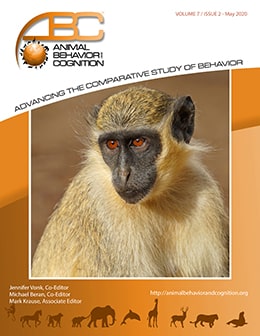Vol 7, Issue 2, May 2020
Evolving Views on Cognition in Animal Vocal Communication: Contributions from Scream Research
Citation
Schwartz, J. W., Engelberg, J. W. M., & Gouzoules, H. (2020). Evolving views on cognition in animal vocal communication: Contributions from scream research. Animal Behavior and Cognition, 7(2), 192-213. doi: https://doi.org/10.26451/abc.07.02.12.2020
Abstract
The last four decades have seen major advances in the study of the cognitive bases of animal vocal communication. The conceptual delineation of senders and receivers has led to a focus on the cognitive processes involved in call production and usage, and those concerning call perception. We review selected relevant literature and discuss how recent thought—specifically, the recognition of a distinction between acoustic variation within versus between call types—expands focus from two to four key questions, specifically, the identification of factors that influence: (1) the usage of different call types, (2) the particular acoustic structure of a vocalization, (3) receivers’ responses to different call types, and (4) receivers’ responses to acoustic variation within a call type. We present the findings of a case study examining the relationship between emotional arousal and the acoustics of scream classes of rhesus macaques (Macaca mulatta) and discuss how the findings relate to broader issues in animal vocal communication and cognition. Screams are phylogenetically widespread, generally highly emotional, and in some taxa, convey complex information about social interactions, making them a promising subject for future research addressing contemporary questions in the field.
Keywords
Vocal communication, Emotion, Arousal, External reference, Primate, Screams
